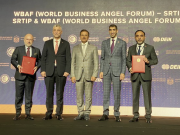World Business Angels Investment Forum (WBAF) announced key-findings of a global survey that included business owners from more than 81 countries and across multiple industries. WBAF, an affiliated partner of the G20 Global Partnership for Financial Inclusion (GPFI), has submitted comprehensive policy recommendations to the G20 leadership in order to alert policymakers about the urgent needs of startups, as revealed by the survey.
Prof. Inderjit Singh, a former Singaporean Parliament Member for 20 years and founder of one of the world’s first unicorns, chairs the WBAF’s Global Startup Committee. Prof. Singh says, ‘At this point, we would like to provide a summary of insights from other global surveys conducted by international organizations over the past few months that offer a complementary views. Some focused only on one segment within the entrepreneurial ecosystem, while others attempted to get a more comprehensive picture. Overall, you will see that the WBAF findings are consistent with these other major surveys.
Prof. Singh’s observations follow:
Ernst and Young Global completed an FDI investment attractiveness survey for Europe in May 2020 that was designed to help businesses make investment decisions and governments remove barriers to growth. Two of the key findings were related to the status of existing projects, specifically that 65% of existing foreign investments were proceeding as planned, 25% were delayed, and 10% were cancelled. The other important insight from this survey was that 66% expected a decrease in 2020 investment plans, while 21% expected a complete delay, and 15% anticipated a substantial decrease.
Deloitte conducted and published the results of a survey on global human capital trends related to the future of work. The report addressed the purpose, potential, perspective and possibilities for the workforce during the COVID-19 economic environment. Two main findings to be highlighted are related to reselling, up-skilling, and compensation of the workforce: 74% of organizations reported that reskilling the workforce was either ‘important’ or ‘very important’ for their organization’s viability over the next 12-18 months. However, only 10% felt they were ready to address this need. The second important finding is related to organizations reporting that changing compensation models for their organizations was important for their success, but only 23% were currently redesigning these models.
PricewaterhouseCoopers has recently completed a CFO Pulse Survey, which gathered opinions from 150 international finance executives. More than 82% of multi-territory respondents reported that COVID-19 had a significant impact on their business, while 32% expected to engage in layoffs, and 52% of respondents expected productivity losses. The top 3 pandemic-related concerns reported were: a potential global recession (67%), a financial impact on their business (60%), and negative effects on their workforce (44%).
Another comprehensive survey series is currently in progress by the SME Finance Forum, and in the last (June) update, members representing 46 countries reported a decline in sales or revenue (37% of respondents), reduced inflows or collections of funds (16%), and asset impairment (13%).
As the world is faced with these widespread economic challenges, it is essential that leading organizations and their representatives take charge by raising awareness and proposing solutions. There is a general consensus among experts about several strategic areas that are recommended for recovery: focus on rebuilding operations and recuperating revenue, rethink the organizational infrastructure, and accelerate the adoption of technology. Only by designing novel business models can we rebuild the global economy and reshape the business ecosystem for future generations.
Re-live the press conference: https://wbaforum.org/Press-Conferences























